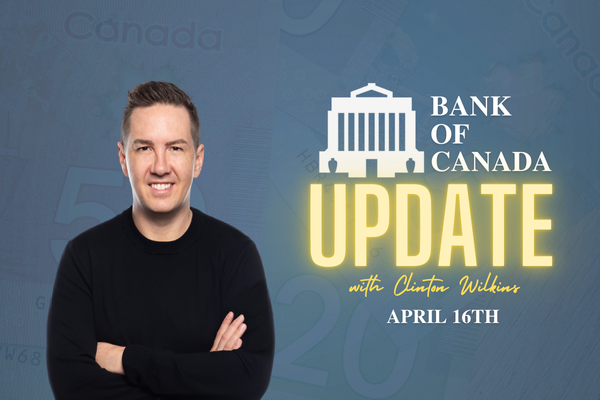On 95.7 News Radio, Clinton and Todd discussed the importance of credit monitoring due to rising fraud and data breaches.
Bank of Canada Announcement – rate increases are far away – June 9, 2021 as heard on News 95.7
Clinton chats with News 95.7 host, Todd Veinotte about the Bank of Canada announcement to hold the key overnight rate. Clinton and Todd discuss how it appears rate increases are far away, but what could happen when rates do go up.
Bank of Canada Announcement – June 9, 2021 as heard on News 95.7
Don’t feel like watching the video? Check out the transcript below.
Transcript:
The rate hold was expected?
Todd Veinotte: [00:00:00:23] All right, before we go back to the phones for the midweek meltdown, we’re going to chat with Clinton Wilkins, who is our mortgage guru and the Bank of Canada is keeping its key interest rate target on hold at 0.25 per cent. Clinton Wilkins, what do you think of this? What are your thoughts on this? It was to be expected, right? Safe to say?
Clinton Wilkins: [00:00:19:18] It was definitely expected. And, you know, really, we think that it’s going to stay low for quite some time. You know, some economists are projecting that, you know, 12, 18 months down the road, we may see some increases. Some economists are saying it could be years down the road before we see any increase to the key overnight rate.
You know, it really is going to depend on what happens with inflation, Todd. And we don’t know. We don’t have a crystal ball for really what’s happening from day to day, let alone month to month. But, you know, inflation still is on the lower side. And, you know, that’s something the government is definitely interested in.
Some economists are stating that they’re going to keep the key rate low until we’re out of COVID altogether. And obviously we’re optimistic. You know, I think there’s lots of good things going on in the economy, but there’s still a lot of rebuilding that’s going to have to happen in Canada and really across the country.
What will happen when the rates do go up?
Todd Veinotte: [00:01:14:04] How is this affecting people? Well, it doesn’t affect, but if rates go up, that impacts people’s variable lines of credit, variable mortgages, and just let people know how this affects their finances. If, in fact, when rates do go up.
Clinton Wilkins: [00:01:28:16] Eventually they will go up. That’s reality. But anybody who’s in a variable rate product is really kind of hedging their bets against things like inflation. They’re hedging their bets, you know, against what a fixed rate would look like.
So when they do increase down the road, anybody who’s in a variable rate mortgage will either see a higher payment or a longer amortization, depending on what type of mortgage product they have. If you have any revolving debt that’s secured to the prime rate, then your cost of borrowing will increase. So that’s something certainly to take into account.
The interesting thing, Todd, is many more clients today are getting a variable rate mortgage than ever have in the past. So I think there’s a lot of optimism out there. You know, obviously, the variable rates are much lower today than they have been and before, you know, new home buyers that are getting a high ratio insured mortgage today are getting rates as low as 1.35 on a variable.
So there’s certainly some room for those borrowers to take some risk fixed rates in the same type of product or over two per cent. So there’s certainly a little bit of wiggle room there. And certainly it’s going to be interesting.
And we watch every day and, you know, we’re listening to what the economists are saying. And all signs are pointed towards, you know, variable being historically cheaper for consumers. And, you know, we really believe in that as well.
Increases are a long way away?
Todd Veinotte: [00:02:55:29] And, again, you don’t feel that, as you’ve already mentioned, that these rates are, the Bank of Canada is going to move these rates up any time soon anyway. That’s safe to say, right?
Clinton Wilkins: [00:03:05:23] It’s going to be months, if not years down the road before we see any increases. Now, obviously, the key overnight rate is really the one lever that the government has to stay inflation.
So if inflation starts going through the roof, yes, they will increase that key rate, adjust to bring that, you know, the inflation down. But the government and, you know, intentionally brought the key rate down in March 2020. The reason that they did that was to really increase the spending and keep liquidity in the market because, you know, there’s a lot of uncertainties and we needed it.
And I think that it’s helped consumers, you know, businesses, banks, you know, really keep things rolling. And, you know, I’m glad that the government is on side with keeping it low during this rebuilding process. And, you know, once the economy is in a situation where, you know, the inflation has increased, I don’t think anyone, you know, is going to be sad about some increases down the road.
And we all know that it’s going to go up. But I think enjoying the low rates right now, you know, obviously is very beneficial for, you know, you and me, the end consumer.
Todd Veinotte: [00:04:16:07] Great stuff, Clinton. Thank you so much for your continued participation and expertise. We appreciate it and talk real soon, my friend.
Clinton Wilkins: [00:04:22:18] Thanks, Todd.
Todd Veinotte: [00:04:23:07] All right. Take care. Clinton Wilkins, our mortgage guru.
If you have any questions, get in touch with us at Clinton Wilkins Mortgage Team! You can call us at (902) 482-2770 or contact us here.


